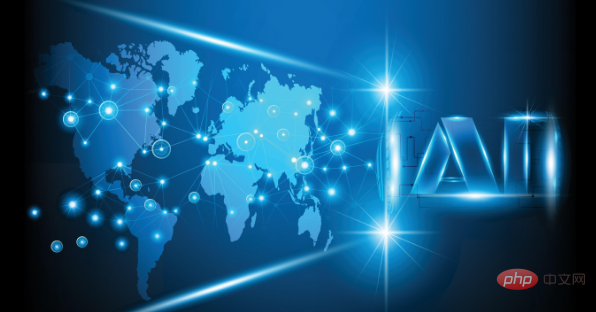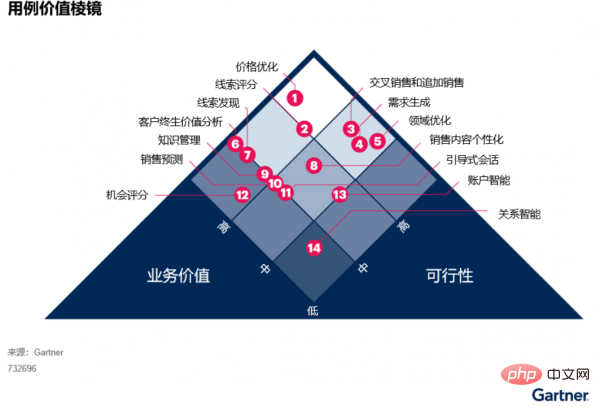 Technology peripherals
Technology peripherals
 AI
AI
 Gartner: China's COVID-19 policy adjustments will promote digitalization and AI applications
Gartner: China's COVID-19 policy adjustments will promote digitalization and AI applications
Gartner: China's COVID-19 policy adjustments will promote digitalization and AI applications

February 24, 2023 - The 2023 Gartner CIO and technology executive survey shows that the Chinese companies surveyed ranked digital transformation as their top priority. In the future, corresponding policy adjustments made in response to the uncertainty of the new coronavirus will become an important driver of digital transformation and artificial intelligence (AI) applications.
Affected by the government’s anti-epidemic policies in the past three years and the severity of COVID-19 infection symptoms, people are more inclined to choose online business processes. This change will prompt corporate organizations to redesign business processes and operating models, reduce physical touch points and opportunities for people to gather offline, and ultimately accelerate China's digitalization process and the wider application of AI. To accelerate the adoption of AI, the use case prism in the figure below shows the prioritization of AI investments.
Gartner Prism

Online activities have become a future trend, not a short-term behavior
How to do it in a healthier and safer way Providing products and services to customers will soon become a key measure of customer satisfaction. The mutation or recurrence of the virus in the future may also have an impact on daily business operations, so only temporary or short-term digital smart solutions should no longer be adopted as in the past three years. Eventually, this ongoing impact will become the new normal. Organizations must adapt or even redesign business processes, decision-making processes, and work environments.
“Virtual first” or “digital first” will become a trend, not an option. Behind this trend, AI will play a key role in efficiently monitoring, verifying and coordinating all new business operations, and the data generated by these new digital solutions will in turn feed AI.
Automated and flexible production lines and operations are priority development goals to deal with the potential future impact of the new coronavirus
The uncertainty of the new coronavirus in the future will affect the production and customer interaction of labor-intensive industries. The operations of the industry bring greater risks, and policy adjustments brought about by this uncertainty will affect the decision-making of corporate leaders. The application of automation and AI will no longer be “optional” but “essential”. Enterprise organizations need to improve the intelligence of production scheduling, reduce reliance on people in the manufacturing process, and improve indicative decision-making capabilities.
Re-make the business case for AI applications rather than focusing primarily on short-term ROI and costs
In China, organizations should consider how people, including employees and customers, are responding to the coronavirus long-term attitude. People will increasingly expect more efficient and convenient digital solutions, and short-term return on investment will no longer be the main consideration. In addition, AI costs can be offset by the mitigation of risks from the impact of the new coronavirus and customer requirements for service continuity and reliability. Generally speaking, the level of digitalization and automation, as well as intelligent and flexible planning and scheduling capabilities, will become strategic development goals for enterprise organizations. These capabilities will give organizations an edge over their competitors in terms of reliability.
The above is the detailed content of Gartner: China's COVID-19 policy adjustments will promote digitalization and AI applications. For more information, please follow other related articles on the PHP Chinese website!

Hot AI Tools

Undresser.AI Undress
AI-powered app for creating realistic nude photos

AI Clothes Remover
Online AI tool for removing clothes from photos.

Undress AI Tool
Undress images for free

Clothoff.io
AI clothes remover

AI Hentai Generator
Generate AI Hentai for free.

Hot Article

Hot Tools

Notepad++7.3.1
Easy-to-use and free code editor

SublimeText3 Chinese version
Chinese version, very easy to use

Zend Studio 13.0.1
Powerful PHP integrated development environment

Dreamweaver CS6
Visual web development tools

SublimeText3 Mac version
God-level code editing software (SublimeText3)

Hot Topics
 How to play picture sequences smoothly with CSS animation?
Apr 04, 2025 pm 05:57 PM
How to play picture sequences smoothly with CSS animation?
Apr 04, 2025 pm 05:57 PM
How to achieve the playback of pictures like videos? Many times, we need to implement similar video player functions, but the playback content is a sequence of images. direct...
 Zustand asynchronous operation: How to ensure the latest state obtained by useStore?
Apr 04, 2025 pm 02:09 PM
Zustand asynchronous operation: How to ensure the latest state obtained by useStore?
Apr 04, 2025 pm 02:09 PM
Data update problems in zustand asynchronous operations. When using the zustand state management library, you often encounter the problem of data updates that cause asynchronous operations to be untimely. �...
 How to quickly build a foreground page in a React Vite project using AI tools?
Apr 04, 2025 pm 01:45 PM
How to quickly build a foreground page in a React Vite project using AI tools?
Apr 04, 2025 pm 01:45 PM
How to quickly build a front-end page in back-end development? As a backend developer with three or four years of experience, he has mastered the basic JavaScript, CSS and HTML...
 How to implement nesting effect of text annotations in Quill editor?
Apr 04, 2025 pm 05:21 PM
How to implement nesting effect of text annotations in Quill editor?
Apr 04, 2025 pm 05:21 PM
A solution to implement text annotation nesting in Quill Editor. When using Quill Editor for text annotation, we often need to use the Quill Editor to...
 How to achieve the effect of high input elements but high text at the bottom?
Apr 04, 2025 pm 10:27 PM
How to achieve the effect of high input elements but high text at the bottom?
Apr 04, 2025 pm 10:27 PM
How to achieve the height of the input element is very high but the text is located at the bottom. In front-end development, you often encounter some style adjustment requirements, such as setting a height...
 How to solve the problem that the result of OpenCV.js projection transformation is a blank transparent picture?
Apr 04, 2025 pm 03:45 PM
How to solve the problem that the result of OpenCV.js projection transformation is a blank transparent picture?
Apr 04, 2025 pm 03:45 PM
How to solve the problem of transparent image with blank projection transformation result in OpenCV.js. When using OpenCV.js for image processing, sometimes you will encounter the image after projection transformation...
 How to use CSS to achieve smooth playback effect of image sequences?
Apr 04, 2025 pm 04:57 PM
How to use CSS to achieve smooth playback effect of image sequences?
Apr 04, 2025 pm 04:57 PM
How to realize the function of playing pictures like videos? Many times, we need to achieve similar video playback effects in the application, but the playback content is not...
 How to implement notifications before task start using Quartz timer and cron expression without changing the front end?
Apr 04, 2025 pm 02:15 PM
How to implement notifications before task start using Quartz timer and cron expression without changing the front end?
Apr 04, 2025 pm 02:15 PM
Implementation method of task scheduling notification In task scheduling, the Quartz timer uses cron expression to determine the execution time of the task. Now we are facing this...





